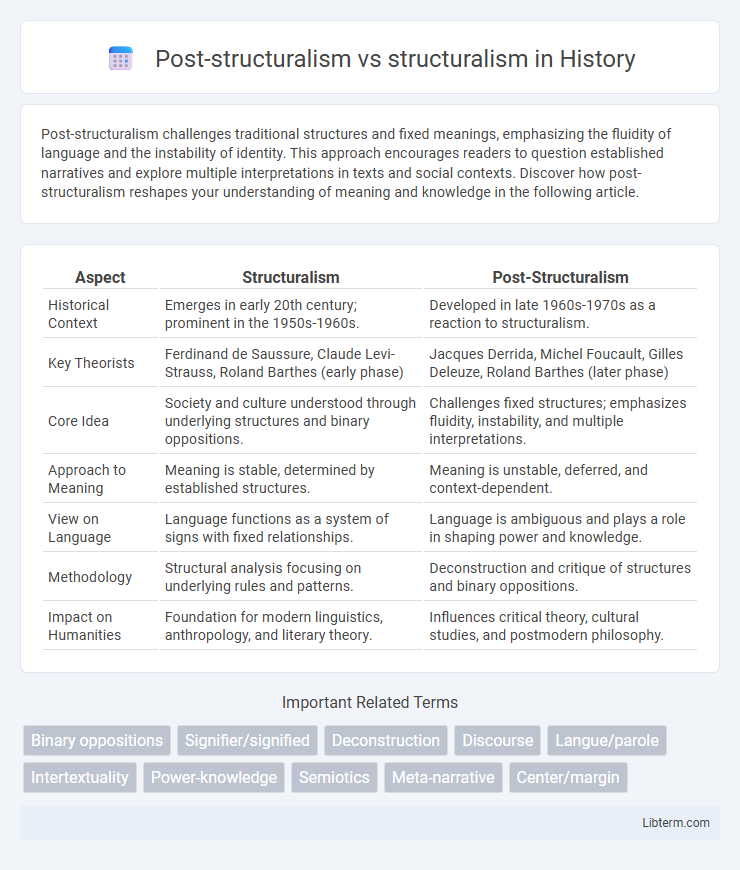Post-structuralism challenges traditional structures and fixed meanings, emphasizing the fluidity of language and the instability of identity. This approach encourages readers to question established narratives and explore multiple interpretations in texts and social contexts. Discover how post-structuralism reshapes your understanding of meaning and knowledge in the following article.
Table of Comparison
| Aspect | Structuralism | Post-Structuralism |
|---|---|---|
| Historical Context | Emerges in early 20th century; prominent in the 1950s-1960s. | Developed in late 1960s-1970s as a reaction to structuralism. |
| Key Theorists | Ferdinand de Saussure, Claude Levi-Strauss, Roland Barthes (early phase) | Jacques Derrida, Michel Foucault, Gilles Deleuze, Roland Barthes (later phase) |
| Core Idea | Society and culture understood through underlying structures and binary oppositions. | Challenges fixed structures; emphasizes fluidity, instability, and multiple interpretations. |
| Approach to Meaning | Meaning is stable, determined by established structures. | Meaning is unstable, deferred, and context-dependent. |
| View on Language | Language functions as a system of signs with fixed relationships. | Language is ambiguous and plays a role in shaping power and knowledge. |
| Methodology | Structural analysis focusing on underlying rules and patterns. | Deconstruction and critique of structures and binary oppositions. |
| Impact on Humanities | Foundation for modern linguistics, anthropology, and literary theory. | Influences critical theory, cultural studies, and postmodern philosophy. |
Understanding Structuralism: Key Concepts
Structuralism centers on analyzing underlying structures in language, culture, and society by identifying binary oppositions and universal patterns. It emphasizes how meaning is generated through relationships within systems rather than individual elements. Key concepts include the signifier and signified, codes, and the idea that structures determine human experience.
The Rise of Post-Structuralism
The rise of post-structuralism emerged as a critical response to structuralism's emphasis on fixed structures and stable meanings within language and culture. Post-structuralist theorists like Jacques Derrida and Michel Foucault challenged the idea of universal truths, emphasizing the fluidity of meaning, the instability of language, and the role of power relations in knowledge production. This shift redefined literary theory, philosophy, and social sciences by highlighting the decentered subject and the multiplicity of interpretations beyond structuralist frameworks.
Foundational Thinkers: Saussure to Derrida
Ferdinand de Saussure, a foundational figure in structuralism, emphasized language as a system of signs defined by differences, establishing binary oppositions as the core of meaning-making. Jacques Derrida, a key post-structuralist, challenged Saussure's fixed structures by introducing deconstruction, revealing inherent instabilities and contradictions within texts. This shift from stable linguistic systems to fluid, dynamic interpretation marks the critical divergence between structuralism and post-structuralism.
Language and Meaning: Structuralist Perspectives
Structuralism views language as a fixed system of signs where meaning arises from the relational differences between elements within a structured whole, emphasizing stable, underlying structures such as those identified by Ferdinand de Saussure. Meaning is considered objective and determinate, derived from binary oppositions and the synchronic analysis of linguistic elements. Post-structuralism challenges this notion by arguing that meaning is fluid, unstable, and context-dependent, suggesting that language is inherently ambiguous and that structures are continually deconstructed through endless play of signification.
The Critique of Structure: Post-Structuralist Rebuttals
Post-structuralism challenges structuralism's rigid frameworks by arguing that structures are not fixed but fluid, emphasizing the instability of meaning and the role of language in shaping reality. It critiques structuralism's tendency to overlook the subjective interpretation and power dynamics inherent in linguistic and cultural systems. Key figures like Derrida and Foucault stress the decentralized, fragmented nature of texts, showing that meanings constantly shift through differance and discourse analysis.
Power, Knowledge, and Discourse
Post-structuralism challenges structuralism by emphasizing the fluidity of power and knowledge within discourse, arguing that meanings are unstable and constantly shifting. Structuralism views power as embedded within fixed structures of language, while post-structuralism highlights power relations as dynamic and decentralized, influencing how knowledge is constructed and circulated. Discourse in post-structuralism is a site of power struggles, where knowledge is both produced and contested, contrasting with structuralism's search for underlying, universal systems of meaning.
Textual Analysis: Differing Approaches
Structuralism in textual analysis focuses on identifying underlying structures, such as language systems and binary oppositions, that shape meaning within a text. Post-structuralism challenges these fixed structures by emphasizing the instability of meaning and the role of reader interpretation, highlighting contradictions and multiple readings. This shift moves analysis from seeking definitive meanings to exploring the fluidity and plurality inherent in texts.
Subjectivity and the Role of the Author
Post-structuralism challenges structuralism's fixed meanings by emphasizing the fluidity of subjectivity and the decentralization of the author's authority, arguing that meaning is produced through multiple interpretations rather than inherent structures. Structuralism positions the author as a central figure whose intentions shape textual meaning, whereas post-structuralism deconstructs this role, suggesting that the author's identity and intentions are fragmented and less determinative. The shift from structuralism to post-structuralism redefines the subject as a decentered, unstable construct and reconfigures the author as a potential site of competing discourses rather than a singular origin of meaning.
Influence on Contemporary Theory
Post-structuralism challenges the fixed meanings and binary oppositions established by structuralism, emphasizing fluidity, ambiguity, and the instability of language in contemporary theory. Structuralism's influence remains foundational, providing systematic analysis of underlying cultural codes, but post-structuralism expands this by incorporating power dynamics, subjectivity, and deconstruction in fields such as literary theory, philosophy, and social sciences. The interplay between these approaches continues to shape critical discussions on identity, representation, and meaning in modern academic discourse.
Comparing Structuralism and Post-Structuralism: Key Differences
Structuralism centers on identifying underlying structures that govern culture and language, emphasizing fixed meanings and binary oppositions within texts. Post-structuralism critiques this fixedness, arguing that meanings are fluid, unstable, and dependent on context, with an emphasis on deconstruction and the multiplicity of interpretations. Key differences lie in structuralism's search for universal patterns versus post-structuralism's focus on language's inherent ambiguity and the rejection of absolute truths.
Post-structuralism Infographic

 libterm.com
libterm.com